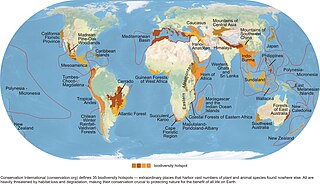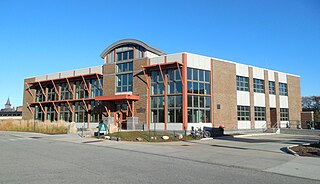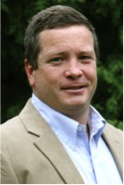
A biome is a distinct geographical region with specific climate,vegetation,and animal life. It consists of a biological community that has formed in response to its physical environment and regional climate. Biomes may span more than one continent. A biome encompasses multiple ecosystems within its boundaries. It can also comprise a variety of habitats.

An ecoregion is an ecologically and geographically defined area that is smaller than a bioregion,which in turn is smaller than a biogeographic realm. Ecoregions cover relatively large areas of land or water,and contain characteristic,geographically distinct assemblages of natural communities and species. The biodiversity of flora,fauna and ecosystems that characterise an ecoregion tends to be distinct from that of other ecoregions. In theory,biodiversity or conservation ecoregions are relatively large areas of land or water where the probability of encountering different species and communities at any given point remains relatively constant,within an acceptable range of variation . Ecoregions are also known as "ecozones",although that term may also refer to biogeographic realms.

The Nearctic realm is one of the eight biogeographic realms constituting the Earth's land surface.

Natural capital is the world's stock of natural resources,which includes geology,soils,air,water and all living organisms. Some natural capital assets provide people with free goods and services,often called ecosystem services. All of these underpin our economy and society,and thus make human life possible.

Ecological economics,bioeconomics,ecolonomy,eco-economics,or ecol-econ is both a transdisciplinary and an interdisciplinary field of academic research addressing the interdependence and coevolution of human economies and natural ecosystems,both intertemporally and spatially. By treating the economy as a subsystem of Earth's larger ecosystem,and by emphasizing the preservation of natural capital,the field of ecological economics is differentiated from environmental economics,which is the mainstream economic analysis of the environment. One survey of German economists found that ecological and environmental economics are different schools of economic thought,with ecological economists emphasizing strong sustainability and rejecting the proposition that physical (human-made) capital can substitute for natural capital.
Conservation status is a measure used in conservation biology to assess an ecoregion's degree of habitat alteration and habitat conservation. It is used to set priorities for conservation.

A bioregion is a geographical area,on land or at sea,defined not by administrative boundaries but by distinct communities of plant and animal species,ecological systems,topographic features,and human cultures. The term is used within the research fields of Biology,Ecology,Biogeography,and Biocultural Anthropology. It was adopted and popularized in the mid-1970s by a school of philosophy called Bioregionalism,which seeks to understand the relationships between human culture and the natural environment within which communities develop over time. Bioregions can be defined at many scales,but are generally considered to be smaller than a Biogeographical Realm or continental-scale Ecoprovince,but larger than a Biotope or local-scale Ecoregion,as defined by the U.S. Environmental Protection Agency.

A biodiversity hotspot is a biogeographic region with significant levels of biodiversity that is threatened by human habitation. Norman Myers wrote about the concept in two articles in The Environmentalist in 1988 and 1990,after which the concept was revised following thorough analysis by Myers and others into "Hotspots:Earth's Biologically Richest and Most Endangered Terrestrial Ecoregions" and a paper published in the journal Nature,both in 2000.

Ecosystem services are the various benefits that humans derive from healthy ecosystems. These ecosystems,when functioning well,offer such things as provision of food,natural pollination of crops,clean air and water,decomposition of wastes,or flood control. Ecosystem services are grouped into four broad categories of services. There are provisioning services,such as the production of food and water. Regulating services,such as the control of climate and disease. Supporting services,such as nutrient cycles and oxygen production. And finally there are cultural services,such as spiritual and recreational benefits. Evaluations of ecosystem services may include assigning an economic value to them.

Robert Costanza is an American/Australian ecological economist and Professor at the UCL Institute for Global Prosperity,University College London. He is a Fellow of the Academy of the Social Sciences in Australia and a Full Member of the Club of Rome.

The Rubenstein School of Environment and Natural Resources (RSENR) is the University of Vermont's natural resources college. The University of Vermont recognized the importance of providing educational opportunities in this field of study,initiating forestry courses in 1888. The first school,originally called The School of Natural Resources was established in 1973. The main home of the Rubenstein School of Environment and Natural Resources,the George D. Aiken Center opened in 1982. The building's name honors Vermont's distinguished late senator and governor.
The Gund Institute for Environment,formerly known as the Gund Institute for Ecological Economics and more commonly known as Gund Institute,is a research institute for transdisciplinary scholarship,Based at the University of Vermont (UVM) and comprising diverse faculty,students,and collaborators worldwide. The Gund Institute offers graduate-level training where students are exposed to a wide range of expertise,perspectives,and techniques through course offerings,weekly discussions and seminars,and research mentoring. The Gund Institute offers a Certificate of Graduate Study in Ecological Economics,available both to UVM graduate students and to anyone pursuing continuing education. In addition,it has a series of problem-solving workshops called "Ateliers" and nearly two hundred educational videos.

Jon D. Erickson is an American ecological economist,professor of sustainability science and policy at the Rubenstein School of Environment and Natural Resources of the University of Vermont in Burlington,Vermont,United States,and fellow of the Gund Institute for Environment.

Gretchen C. Daily is an American environmental scientist and tropical ecologist. She has contributed to understanding humanity's dependence and impacts on nature,and to advancing a systematic approach for valuing nature in policy,finance,management,and practice around the world. Daily is co-founder and faculty director of the Natural Capital Project,a global partnership that aims to mainstream the values of nature into decision-making of people,governments,investors,corporations,NGOs,and other institutions. Together with more than 300 partners worldwide,the Project is pioneering science,technology,and scalable demonstrations of inclusive,sustainable development.
Rory Waterman is an American chemist. He is a full professor and associate dean of inorganic,organometallic,and catalysis at the University of Vermont.
Aimée Classen is an American ecologist who studies the impact of global changes on a diverse array of terrestrial ecosystems. Her work is notable for its span across ecological scales and concepts,and the diversity of terrestrial ecosystems that it encompasses,including forests,meadows,bogs,and tropics in temperate and boreal climates.











